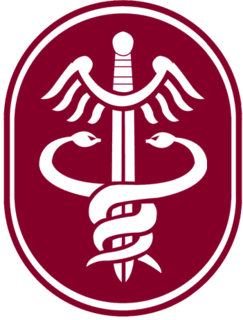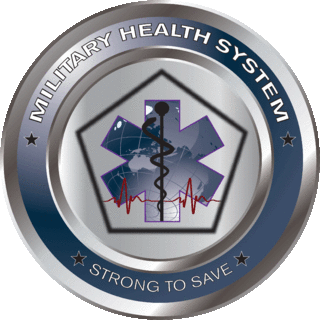Related Research Articles

Post-traumatic stress disorder (PTSD) is a mental disorder that can develop after a person is exposed to a traumatic event, such as sexual assault, warfare, traffic collisions, child abuse, or other threats on a person's life. Symptoms may include disturbing thoughts, feelings, or dreams related to the events, mental or physical distress to trauma-related cues, attempts to avoid trauma-related cues, alterations in how a person thinks and feels, and an increase in the fight-or-flight response. These symptoms last for more than a month after the event. Young children are less likely to show distress, but instead may express their memories through play. A person with PTSD is at a higher risk of suicide and intentional self-harm.

The U.S. Army Medical Command (MEDCOM) is a direct reporting unit of the U.S. Army that formerly provided command and control of the Army's fixed-facility medical, dental, and veterinary treatment facilities, providing preventive care, medical research and development and training institutions. On October 1, 2019, operational and administrative control of all military and veteran medical facilities transitioned to the Defense Health Agency.

Chronic traumatic encephalopathy (CTE) is a neurodegenerative disease which causes severe and irreparable brain damage, as a result of repeated head injuries. Symptoms do not typically begin until years after the injuries and can include behavioral problems, mood problems, and problems with thinking. The disease often gets worse over time and can result in dementia. It is unclear if the risk of suicide is altered.
Polytrauma and multiple trauma are medical terms describing the condition of a person who has been subjected to multiple traumatic injuries, such as a serious head injury in addition to a serious burn. The term is defined via an Injury Severity Score (ISS) equal to, or greater than 16. It has become a commonly applied term by US military physicians in describing the seriously injured soldiers returning from Operation Iraqi Freedom in Iraq and Operation Enduring Freedom in Afghanistan. The term is generic, however, and has been in use for a long time for any case involving multiple trauma.

Madigan Army Medical Center, located on Joint Base Lewis-McChord just outside Lakewood, Washington, is a key component of the Madigan Healthcare System and one of the largest military hospitals on the West Coast of the United States.
The President's Commission on Care for America's Returning Wounded Warriors, also known as the Dole-Shalala Commission, was established on March 6, 2007 when U.S. President George W. Bush signed Executive Order 13426. The Commission was established to examine and recommend improvements to the effectiveness and quality of transition from to return to military service or civilian society, health care, benefits, outreach to Service members and awareness by Service members of health care and benefits programs.

The Military Health System (MHS) is the enterprise within the United States Department of Defense that provides health care to active duty, Reserve component and retired U.S. Military personnel and their dependents.

The Army Wounded Warrior Program (AW2) is the official U.S. Army program that assists and advocates for severely wounded, ill or injured Soldiers, Veterans, and their Families and Caregivers, wherever they are located, regardless of military status. Soldiers who qualify for AW2 are assigned to the program as soon as possible after arriving at the Warrior Transition Unit (WTU). AW2 supports these Soldiers and their Families throughout their recovery and transition, even into Veteran status. Through the local, personalized support of AW2 Advocates, AW2 strives to foster the Soldier's independence. There are more than 20,000 severely wounded, ill and injured Soldiers and Veterans currently enrolled in AW2.
David Xavier Cifu is an American physiatrist, researcher, and medical educator. He is the Associate Dean for Innovation and System Integration in the School of Medicine at Virginia Commonwealth University School of Medicine, the chairman and Herman J. Flax M.D. Professor of the Department of Physical Medicine and Rehabilitation (PM&R) at Virginia Commonwealth University (VCU) in Richmond, Virginia, staff physiatrist at the Hunter Holmes McGuire Veterans Administration Medical Center (HHM-VAMC), founding director of the VCU-Center for Rehabilitation Science and Engineering and senior TBI specialist in the Department of Veterans Affairs' Veterans Health Administration.
The Naval Center for Combat and Operational Stress Control (NCCOSC) is a U.S. Navy Medicine organization established to promote psychological health in the U.S. Navy and Marine Corps. It is a culturally relevant center that leverages sound medical knowledge to improve resilience, preserve psychological health, improve care for sailors, marines and their families and facilitate Navy Medicine research efforts on psychological health and traumatic brain injury.
The National Intrepid Center of Excellence (NICoE) is a Department of Defense organization working to advance the clinical care, diagnosis, research and education of military service members with traumatic brain injuries (TBI) and psychological health (PH) conditions. While its sister organization, the Center for the Intrepid, treats amputee and/or burned service members, the NICoE provides diagnostic evaluations and treatment of complex TBI and PH conditions to promote physical, psychological and spiritual healing.

The Intrepid Fallen Heroes Fund is a non-profit organization that currently builds advanced treatment centers to provide care to military personnel suffering from traumatic brain injury (TBI) and post-traumatic stress (PTS). Since its inception in 2000, IFHF has provided over $200 million to treat service members with TBI and PTS and those with amputations and severe burn injuries, in addition to helping families of US military personnel killed in action.
The National Center for Telehealth & Technology (T2) is one of the Defense Centers of Excellence for Psychological Health and Traumatic Brain Injury (DCoE), a part of the Military Health System (MHS). T2 was originally established to lead the integration of behavioural sciences with technology to provide solutions for psychological health and traumatic brain injury (TBI). T2 is a principal coordinator of United States Department of Defense (DoD) initiatives involving telehealth, online health tools, suicide surveillance and prevention, and information technology.
The Military Acute Concussion Evaluation (MACE) is a medical screening and documentation measure that is used to gauge the severity of symptoms and cognitive deficits after a diagnosis of a concussion has been made. Taking less than 15 minutes to administer, it involves collecting a history of the injury event and the symptoms experienced at that time, followed by a brief neurological screening, and a similarly short cognitive test. The score is presented with a listing of symptoms endorsed and a red or green light regarding the neurological screen. All cases of a concussion result in mandatory restricted duty for 24 hours followed by immediate reevaluation via the MACE. Similarly, the MACE is most effective if given within 24 hours of the injury event to fully gauge the level of possible brain injury. The MACE has been distributed to all branches of the US military. It is currently used in DVBIC and the US Department of Veterans Affairs (VA) Veterans Health Administration are partners in clinical care, education, research and care coordination for veterans and active-duty service members who have sustained a traumatic brain injury.
The Center for Deployment Psychology (CDP) is an organization offering training for behavioral health professionals who provide mental health services unique to the experience of deployment in the United States Armed Forces for active-duty military service members, veterans and their families. CDP is headquartered at the Uniformed Services University of the Health Sciences (USUHS) in Bethesda, Maryland and is funded by the United States Department of Defense.
The Chronic Effects of Neurotrauma Consortium or CENC is a federally funded research project devised to address the long-term effects of mild traumatic brain injury in military service personnel (SMs) and Veterans. Announced by President Barack Obama on August 20, 2013, the CENC was one of two major initiatives developed in response to the injuries incurred by U.S. service personnel during Operation Enduring Freedom and Operation Iraqi Freedom. The project is jointly funded in the amount of $62.175 million by the Department of Defense (DoD) and the Department of Veterans Affairs (VA). The CENC is led by Dr. David X. Cifu of the Virginia Commonwealth University.
Moral injury refers to an injury to an individual's moral conscience and values resulting from an act of perceived moral transgression, which produces profound emotional guilt and shame, and in some cases also a sense of betrayal, anger and profound "moral disorientation".
Operational stress injury or OSI is a non-clinical, non-medical term referring to a persistent psychological difficulty caused by traumatic experiences or prolonged high stress or fatigue during service as a military member or first responder. The term does not replace any individual diagnoses or disorders, but rather describes a category of mental health concerns linked to the particular challenges that these military members or first responders encounter in their service. There is not yet a single fixed definition. The term was first conceptualized within the Canadian Armed Forces to help foster understanding of the broader mental health challenges faced by military members who have been impacted by traumatic experiences and who face difficulty as a result. OSI encompasses a number of the diagnoses found in the Diagnostic and Statistical Manual of Mental Disorders (DSM) classification system, with the common thread being a linkage to the operational experiences of the afflicted. The term has gained traction outside of the military community as an appropriate way to describe similar challenges suffered by those whose work regularly exposes them to trauma, particularly front line emergency first responders such as but not limited to police, firefighters, paramedics, correctional officers, and emergency dispatchers. The term, at present mostly used within Canada, is increasingly significant in the development of legislation, policy, treatments and benefits in the military and first responder communities.
Warrior Care Network is a national health system of PTSD treatment centers that provide care, travel and accommodations at no cost for United States veterans and their families. Treatment consists of intensive outpatient care, mainly focusing on PTSD, and TBI. Warrior Care Network began accepting veterans into the program on January 15, 2016. It was created by a joint effort between Wounded Warrior Project, the U.S. Department of Veterans Affairs and partners consisting of four regional academic medical research hospitals located throughout the United States. Initial cost of the project was $100 million which was funded by a three-year grant from Wounded Warrior Project and its treatment center medical partners.

Alison Nenos Cernich is an American neuropsychologist specializing in traumatic brain injury and computerized neuropsychological assessment. She is the deputy director of the Eunice Kennedy Shriver National Institute of Child Health and Human Development. Cernich was previously deputy director of the Defense Centers of Excellence for Psychological Health and Traumatic Brain Injury, assistant professor of neurology at University of Maryland School of Medicine, and chief of neuropsychology at the VA Maryland Health Care System.
References
- ↑ "About DCoE". dcoe.health.mil. Archived from the original on 2013-05-24. Retrieved 2013-05-11.
- ↑ NIH, DOD, and VA Host Two Day Conference on Trauma Spectrum Disorders: The Role of Gender, Race & Other Socioeconomic Factors Archived 2009-09-24 at the Wayback Machine , National Institute of Health Press Release, September 2008. Retrieved February 23, 2009.
- ↑ Talk, Listen, Connect: Deployments, Homecomings, Changes Archived 2010-03-14 at the Wayback Machine , Sesame Street Workshop Web site. Retrieved February 23, 2009.
- ↑ Combat vets’ needs seen as escalating [ permanent dead link ], San Antonio Express-News, January 15, 2009. Retrieved February 23, 2009.
- ↑ Statement for the Record by Gordon England, Deputy Secretary of Defense and Gordon Mansfield, Deputy Secretary of Veterans Affairs before the Senate Committee on Armed Services Archived 2010-05-27 at the Wayback Machine , February 13, 2008. Retrieved February 23, 2009.
- ↑ "Defense Centers of Excellence for Psychological Health and Traumatic Brain Injury, Spring 2013" (PDF). dcoe.health.mil. Archived from the original (PDF) on 2014-05-06. Retrieved 2013-05-11.
- ↑ "Defense Centers of Excellence for Psychological Health and Traumatic Brain Injury, Spring 2013" (PDF). dcoe.health.mil. Archived from the original (PDF) on 2014-05-06. Retrieved 2013-05-11.